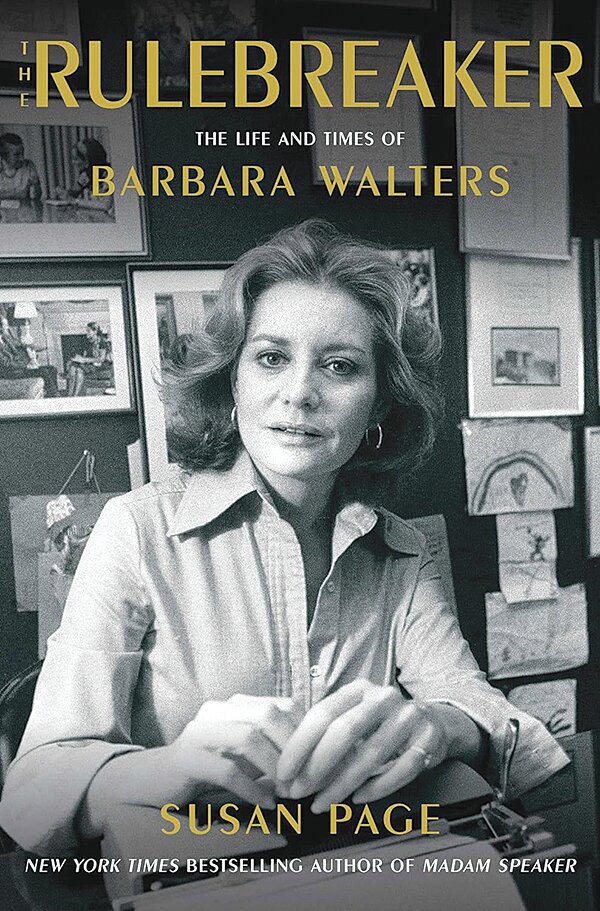A full portrait of a woman who broke barriers for others
Barbara Walters became a household name and a force with which to be reckoned from the time TV was …
This item is available in full to subscribers.
Please log in to continue |
Register to post eventsIf you'd like to post an event to our calendar, you can create a free account by clicking here. Note that free accounts do not have access to our subscriber-only content. |
Day pass subscribers
Are you a day pass subscriber who needs to log in? Click here to continue.
A full portrait of a woman who broke barriers for others
“Rulebreaker: The Life and Times of Barbara Walters”
By Susan Page
Barbara Walters became a household name and a force with which to be reckoned from the time TV was “exploding on the American scene.” A groundbreaker for women, she had no role models herself as she ascended to becoming one of the most famous and influential TV journalists in history.
Prominent in the interview genre, she was accused of being pushy and aggressive in scooping the big ones — presidents, movie stars, criminals, and despots. She was addicted to the chase of a big story.
By the time she retired, she had interviewed more of the famous and infamous than anyone else — male or female — in the business: Golda Meir, first Prime Minister of Israel; Anwar Sadat, Menachem Begin, Henry Kissinger, the Dalii Lama, Katherine Hepburn, Audry Hepburn, Lucille Ball, Bette Davis, Fidel Castro, Monica Lewinsky, to name only a few. This last with the young intern who dallied with President Clinton and caused a scandal, was the most watched program in television history. Millions in the U.S. and around the world tuned in to see it.
As for Fidel Castro, some sensed a spark between them. They seemed to flirt with each other, and Barbara admitted that she “liked him a lot, He is the kind of strong-willed man I find attractive.” Cuban Americans who had fled his dictatorial regime were appalled that she had given a friendly platform to such as he.
In later life she would be bitter about how difficult it had been for her to succeed while she had paved the way for younger newswomen who became her beneficiaries. She was said to have an intense rivalry with Diane Sawyer, who not only was younger, considered more attractive and charming, enjoyed a happy marriage, but was also favored by their producer. Diane, however, said Barabra was brilliant and worked harder than anyone else.
Norah O’Donnell said she had been inspired by Walters. Seventeen-year-old Oprah Winfrey entered a Nashville competition saying she wanted to be just like Barbara Walters. In Connecticut, Jen Pataki negotiated with her parents to stay up past her bedtime to watch Barbara on “20/20.” Katie Couric said she didn’t know where she would be if it hadn’t been for Barbara breaking the glass-ceiling.
Because of this, Connie Chung said Walters had earned the right to be a “diva.” And “diva” was what she was considered when she demanded a million-dollar contract for services. Some said she had grown “too big for her britches,” but Barbara drew large audiences and could command that high a salary.
Before the “Me too” movement, she had struggled all the way up. Co-anchor Harry Reasoner resented having a female for co-anchor and visibly showed his disdain on the screen. Rhode Island Sen. John O. Pastore was outraged that “they are paying that little girl more than the President of the United States.”
When Hugh Downs retired, Frank McGee was incensed that he had to work with a woman. On air, he insisted that he get to ask the first three questions (as if it were a male right) before she could speak, suggesting she stick with the “girlie” interviews. When told she would be covering Nixon’s historic trip to China, McGee announced “not far enough.”
This is a thorough study of Walter’s career and rise from a backstage writer on the “Today” show to setting an interview record no one would break. It is unfortunate that she could never relax enough to savor her accomplishments; no matter how high her profile, the number of awards she received, or how much money she made, she was always driven to outdo herself on the next project. Even when she was dominating the ratings, she was never at peace, concerned that it would all be taken away.
The author provides a plethora of background information, beginning with her dysfunctional childhood with a father who would make and lose a fortune many times over and an intellectually disabled sister who enjoyed more attention from their mother, leaving Barbara craving for her share.
In later years, Barbara herself said one could “never have it all,” and the author supports this statement by detailing her four marriages (twice to the same person), her tribulations with a troubled, drug-addicted daughter, and her sad final years when she withdrew from everyone. It was a sad end for one so celebrated who could not take comfort in all she had achieved.
This is a full portrait on a complex woman who reached the pinnacle of broadcast journalists and in doing so broke the stereotype that a woman covering politics and war would not be taken seriously.
Donna Bruno is a prizewinning author and poet recently recognized with four awards by National League of American Pen Women.






